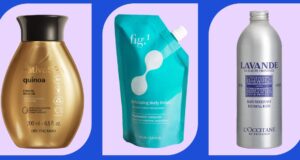If you’re recently pregnant, you’re likely looking for the best ways to keep yourself and your baby healthy during this time. But now, a new study finds that some prenatal vitamins could contain potentially harmful substances that could jeopardize your safety.
Vitamins and supplements have always been an iffy category in the United States, given that they’re categorized as “food” by the Food and Drug Administration (FDA) and therefore not evaluated before they’re sold to consumers. As a result, some vitamins can contain ingredients they’re not supposed to.
If you take prenatal vitamins, it’s understandable to be concerned. Here’s what an ob-gyn wants you to know.
Meet the expert: Christine Greves, MD, is an ob-gyn at the Winnie Palmer Hospital for Women and Babies in Orlando, Florida.
What did the study find?
For the study, which was published in the American Journal of Clinical Nutrition in November, researchers from the University of Colorado tested 47 prenatal vitamins. Of those, 32 were over-the-counter and 15 required prescriptions. Each was tested for choline and iodine levels, as well as the presence of toxic metals like arsenic, lead, and cadmium.
The researchers discovered that seven of the products had arsenic levels above the purity limits set by the US Pharmacopeia (USP), two had elevated levels of lead, and 13 had too much cadmium.
“Current prenatal multivitamins and minerals labels are misleading with the potential to harm pregnant persons and fetuses through omission or inaccurate content of essential nutrients and inclusion of heavy metals,” the researchers concluded in the study.
Unfortunately, the study didn’t list out the vitamins that the contaminants were found in.
Why are toxic metals bad for humans?
It depends on the metal. There is no safe level of lead, which has been linked to developmental disorders and high blood pressure, among other things. So any lead exposure isn’t great.
Arsenic is a naturally occurring substance that’s found in the air, water, and soil, per the National Cancer Institute (NCI). It’s divided into organic and inorganic arsenic, with inorganic arsenic being the most concerning. Prolonged exposure has been linked to lung and bladder cancer, along with developmental diseases and diabetes. (The study didn’t differentiate between inorganic and organic arsenic.)
Chronic exposure to cadmium can damage the kidneys, bones, and lungs, as well as raise your risk for certain types of cancer, according to the Occupational Safety and Health Administration (OSHA).
How can I avoid toxic metals in prenatal vitamins?
This is “tricky” given that the vitamin brands weren’t shared publicly, says Christine Greves, MD, an ob-gyn at the Winnie Palmer Hospital for Women and Babies in Orlando, Florida. However, she stresses the importance of purchasing prenatal vitamins from a source that you trust, including “a source that you trust or that your doctor recommends.”
She also points out that big-name brands often have more to lose and therefore usually have stricter regulations and testing around what ends up in their products.
Finally, Greves recommends looking for vitamins that undergo third-party testing—meaning, an outside company tests them to ensure what’s actually inside the bottle.
“It would be great if the FDA provided more regulation around these but, sadly, this is what we have,” she says.
Korin Miller is a freelance writer specializing in general wellness, sexual health and relationships, and lifestyle trends, with work appearing in Men’s Health, Women’s Health, Self, Glamour, and more. She has a master’s degree from American University, lives by the beach, and hopes to own a teacup pig and taco truck one day.




